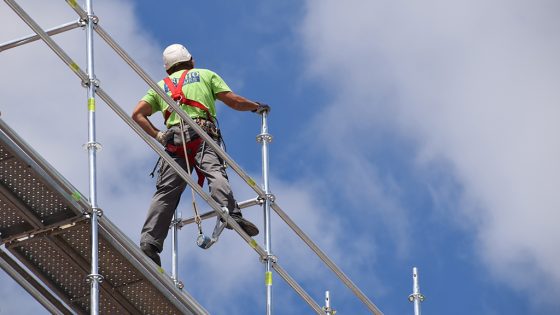The number of Health and Safety Executive (HSE) investigations into falls from height in construction has dropped starkly, Construction News can reveal.
Prospect, the union representing HSE inspectors, warned that the organisation has scaled back its investigations across all types and abolished its construction division.
Data obtained by CN under the Freedom of Information Act shows that there were just 107 investigations into falls from height in construction in 2023, and 114 in 2022, down from 177 in 2016 and 211 in 2017.
The number of fatal incidents, which are always investigated, have not declined in the same period (see box below for full figures), suggesting that falls from height remain a serious issue.
Prospect senior deputy general secretary Sue Ferns pointed out that the number of main grade inspectors – who do most of the organisation’s inspections and investigations – has fallen from 962 in 2003 to 617 in 2023.
Statistics provided by the union show that 659 investigations, of all types, were officially shelved due to a “lack of resources” in 2023, compared with just four in 2015.
“It is clear that the immediate reason for the reduction in investigations into falls from height is the decline in the number of available inspectors. If appropriate levels of inspections and investigations are not happening then that should worry anyone who values safety at work,” said Ferns.
“The bottom line is that if effective investigations cannot be carried out then those who are at fault for an accident may get away with it, depriving victims of justice and making workplaces less safe.”
| Year | Investigations | Fatalities |
| 2016 | 177 | 14 |
| 2017 | 211 | 22 |
| 2018 | 176 | 19 |
| 2019 | 184 | 19 |
| 2020 | 151 | 21 |
| 2021 | 130 | 18 |
| 2022 | 114 | 25 |
| 2023 | 107 | 20 |
Peter Bennett, chair of both the No Falls Foundation and Access Industry Forum, said falls from height are often devastating for people involved, even when not fatal, with many unable to return to work.
“It’s therefore disappointing to see a steady decline in HSE investigations over recent years due to ongoing budget cuts,” he said.
He added that he is concerned that many incidents are not investigated and companies flouting the law may not be held to account.
“There is a real risk that some might see a stretched HSE as an opportunity to ‘cut corners’ and put workers’ lives at greater risk, believing incidents now are less likely to be investigated,” Bennett said.
The No Falls Foundation and Access Industry Forum are both calling for reforms to the RIDDOR process so that more detailed information is collected about incidents.
“With the number of HSE investigations in decline, this crucial more granular information will enable the industry to address the root cause of accidents and implement informed, preventative measures that will undoubtedly save lives and reduce the burden on an already constrained regulator,” he said.
An HSE spokesperson said: “We don’t accept any suggestion that we’re deprioritising construction.”
They said the organisation’s guidance for working at height is “well-established and easily accessible”.
“We target our inspection strategy based on intelligence, focusing on the greatest hazards and sectors with the worst safety record and remain committed to using inspections to drive up performance.
“Investigations and inspections are only part of what we do to keep people safe. We use a range of regulatory tools to improve health and safety, such as influencing industries and providing free, clear, accessible guidance,” they added.
Earlier this year, a special CN report highlighted the dangers associated with working at height and the lack of robust data on non-fatal incidents.

